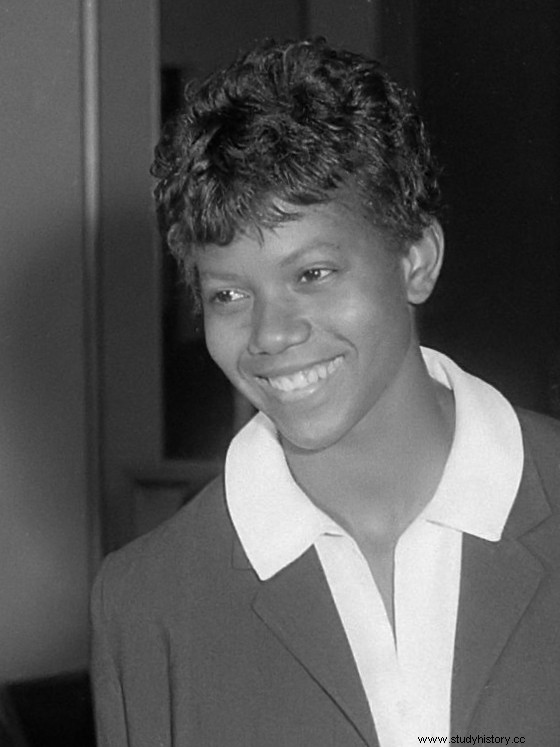American athlete, Wilma Rudolph (1940 – 1994) showed an iron will to overcome obstacles and won three gold medals at the Olympic Games. She paved the way for black American athletes.
A sick childhood

Seventeenth of a family of twenty-one children, Wilma Glodean was born prematurely on June 23, 1940 in a modest family in Clarksville, Tennessee in the United States. Her mother is a chambermaid, her father a porter. As a child, she suffered from double pneumonia, scarlet fever and above all from poliomyelitis which threatened to cause her to lose the use of her left leg.
Serious illness, polio disables or kills millions of people each year, and doctors believe that Wilma will never walk again. In the midst of racial segregation, she cannot be treated at the city hospital and has to travel to Nashville twice a week for treatment. Equipped with a prosthesis, she must also receive four daily massages, which her older brothers and sisters have learned to provide.
Healing by running
By dint of care, Wilma Rudolph can do without the prosthesis she wears on her left leg, then, at the age of eleven, her orthopedic shoes. To strengthen her leg, but also to compensate for these childhood years of watching her brothers and sisters run without being able to imitate them, she throws herself into sport head on. First in basketball, where her coach nicknamed her Skeeter ("Mosquito") saying, "You're little, you're fast and you always get in my way" ("You're small, you're fast and you're always on my way") . Then, spotted by the coaches, in the running.
Wilma is quickly noticed for her potential. While still in high school, she was invited by the University of Tennessee "Tigerbelles" women's track and field club for a summer camp. At sixteen, she participated in the 1956 Melbourne Olympics and won a bronze medal in the relay.
The fastest woman on Earth
In 1958, Wilma Rudolph joined the University of Tennessee "Tigerbelles", known for her good track records and for having a dedicated and demanding coach, Edward Temple. That same year, she gave birth to her first daughter, Yolanda; she will have four. Two years later, in July 1960, Wilma broke a first world record by running the 200 meters in less than 23 s.
But it was during the 1960 Rome Olympics that Wilma particularly distinguished herself. She won three gold medals, in 100 meters, 200 meters and 4 x 100 meters relay. In the 100m final, Wilma finished three meters ahead of her competitors. Her dazzling successes have made her one of the most popular and acclaimed sportswomen in the games; she will be nicknamed “the tornado, the fastest woman on Earth”.

Wilma returns home in triumph, and her town celebrates her victories and her return with “Welcome Wilma Day,” a day full of festivities. In the midst of racial segregation, the champion forces the governor of Tennessee and the city of Clarksville to open the event to all:more than a thousand people attend the banquet and the parade, the first event open to all in the city.
End of career
Wilma Rudolph's victories made her the sportswoman, if not perhaps the most famous and popular black woman of her time, both in the United States and internationally. Her new status as an icon motivates many young women to engage in sports, and has earned Wilma to appear in TV shows and in a documentary dedicated to her.
After breaking the record in 100 meters and winning a few more races, Wilma ended her career in 1962, wishing to leave at the top of her game. She completed her studies at the University of Tennessee and became a teacher. Divorced twice, she raises her four children alone and, in parallel with her career, is involved against segregation and in NGOs promoting the practice of sport. In Chicago, she is responsible for the sports education program for young black girls.
Wilma Rudolph died of cancer in November 1994, at the age of 54. The influence of his prowess and journey on black American athletes remains considerable.
